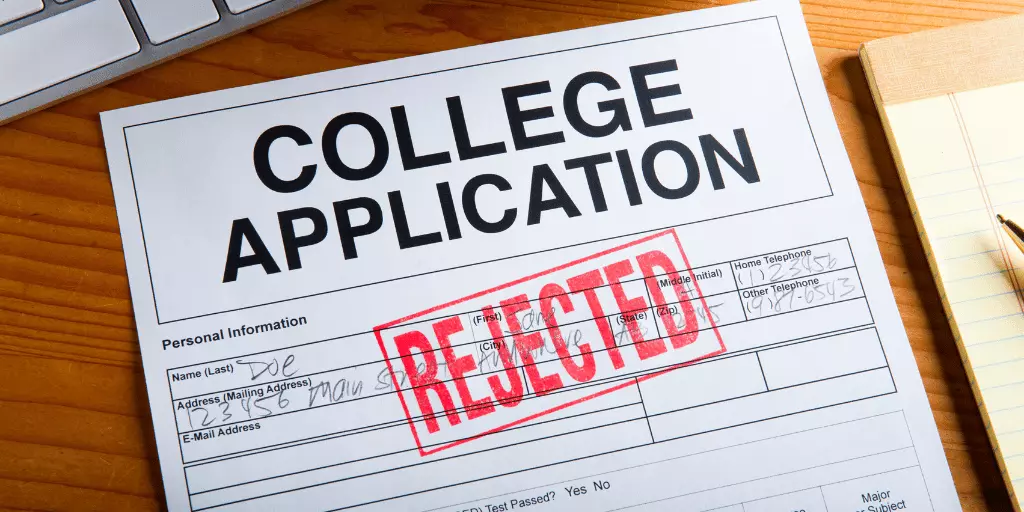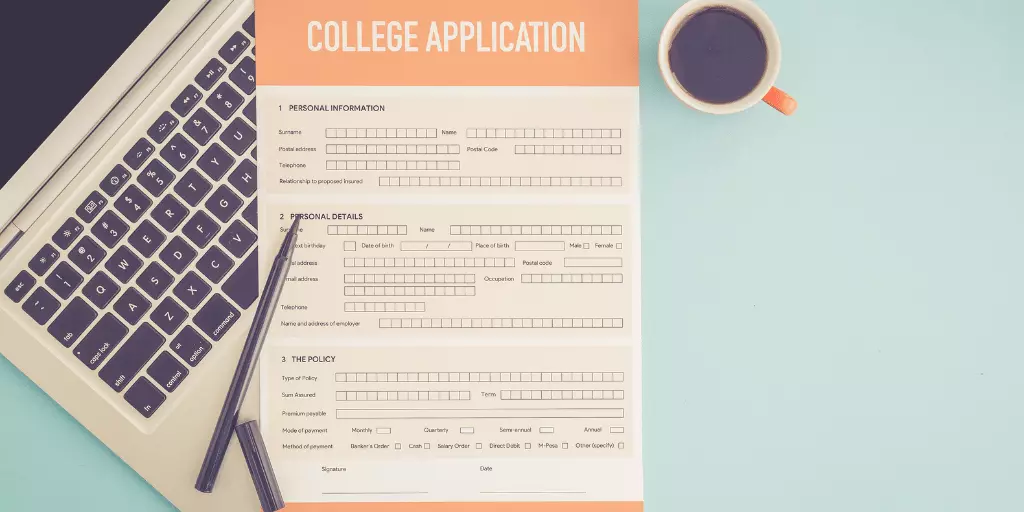Students in their final year of high school have many aspirations for their college life. They are excited to land their dream college and begin the next chapter of their life. For some students, the journey takes an unexpected turn when their applications are rejected by their dream college. If you’re a student who has been rejected by your dream college or you’d like to be prepared for a possible college rejection, take a deep breath and follow us through this blog post.
We have put together a comprehensive guide to help you move ahead with this disappointment and plan best for your future. Remember, receiving a rejection letter isn’t the end. There are several things that you can do to turn this around. So let’s discuss them. We’ll start by learning why your application has been rejected in the first place.
Why College Applications are Rejected
There are several reasons why colleges reject your application. Each college has admission criteria according to which they evaluate your application and decide whether you’re fit for this or not.
One reason your application might be rejected is the failure to meet a certain GPA or standardized test score requirements. Each college sets its stringent academic performance requirements and students must maintain a high academic performance during their school years to meet these standards.
Moreover, colleges also prefer students who have challenged themselves with advanced exams such as Advance Placement (AP) and International Baccalaureate (IB) courses. So if your application fails to demonstrate significant academic rigor, colleges might reject you.
Some colleges also reject students because of their poor application. If your personal statement is irresponsibly written, you haven’t demonstrated enough interest in the college, or the application lacks a personal touch, colleges wouldn’t value it much.
Another reason is high competition. If the college you’ve applied to is very competitive, a large pool of applicants may make it difficult to get admission for those who are even a little behind the curve.
How to Avoid College Rejection?
If you are still in high school, then it is a no-brainer that you should study responsibly and become a high-performing student to maximize your chances of college admission in the future. And if you’re applying to the colleges, you can take the following steps:
Write a Compelling Personal Statement: Your statement is the window through which admission officers look at your personality and aspirations. Make it stand out from the rest. Include personal stories and highlight your individuality.
Apply Early: Applying through early action or early decision increases the possibility of admission. It shows colleges that you are eager to study in their college and also helps you get ahead of the competition.
Don’t Rush and Avoid Mistakes: Rushing through the process increases the chances of mistakes in the application. You should start early and meticulously review each part of the application to ensure it’s up to the mark.
How to Respond to a College Rejection Letter?
When students face college rejection, they should consider writing a response to it. Responding to a rejection letter isn’t mandatory but it is a good practice if you want to reapply to the same college later on.
So if you decide to respond to the rejection letter, follow the following steps.
- Address directly to the person who has sent you the rejection letter.
- Introduce yourself and show interest in the institution
- State your purpose clearly whether you want to take alternative programs, apply to the same program later on, or anything else.
- Show gratitude for the opportunity to apply to college and also express regret that you couldn’t make it through
- Close professional with regards, to your full name, and signature
How to Deal With a Rejection Psychologically?
Being rejected is always a mental trauma, whether it be being rejected by a person, a job, or a college. When students fail to make it to their favorite college, they are heartbroken and keep ruminating as if it is the last option of their life to succeed. If you also find yourself struggling mentally, take the following steps:
Don’t Take It Personally: Though it seems like a personal blow, the truth is far from it. If you couldn’t get admission to a college, it doesn’t mean that you’re lacking something in your identity. Admission is a complex process that depends on several factors that are out of your control and a rejection doesn’t negate your past accomplishments.
Acknowledge Your Feelings: After such an incident, it’s natural to feel disappointed, upset, or angry. Don’t suppress these emotions and permit yourself to feel a sense of loss. Sharing your feelings with a loved one or counselor also helps.
Find Inspiration in Others’ Stories: Remember that you’re not the first one to be rejected by college. Read the biographies and testimonials of the prominent figures who couldn’t make it to college. It’ll help you to acknowledge that rejection isn’t a roadblock, it’s a redirection.
Keep Perspective: Always keep in mind your long-term perspective of what you want to do in your life. There are multiple pathways to success and this temporary rejection shouldn’t shift your focus from your long-term goals.
Write an Appeal Letter – But Carefully!
If you can’t stand the idea of not getting into your dream college, you can appeal to reconsider your application. But here’s the catch, not all institutions allow it and they might get annoyed if you do so. So it’s necessary to read the college policies and rules about the appeal letter first.
If your college allows an appeal letter and you absolutely want to study there, you can write an appeal letter to provide more additional information or context that might have been overlooked the first time.
To write an effective appeal letter, follow these steps:
- Understand why you’re rejected so that you can address the issue in the letter
- Provide new context, and information and share your relevant achievements that you hadn’t shared before.
- Show your sincere interest and tell them why you’re a good fit for the college
- Adhere to the guidelines and rules mentioned by the college
- Ask your teachers, counselors, or anyone who has written an appeal letter before to guide you.
While writing an appeal letter increases the chances that your application will be reconsidered, it doesn’t guarantee admission. It’s important to keep this limitation in mind during the appeal process.
Consider the Colleges That Have Accepted You
You might have been very obsessed with your dream college but what students fail to see is that other colleges might provide them with the same level of educational quality and facilities, if not the same type of glamour. So it’s not a bad idea to stop ruminating about your intended college and start exploring the available options.
Think about the reason you were attracted to your dream college. Was it a vibrant campus culture or a particular academic program? Or something related to extracurriculars? Now start exploring and visiting the colleges that have said yes and see if they have the particular characteristics you want in a college.
Evaluate colleges with an open mind and a positive outlook. Keep in mind that getting into a prestigious institute isn’t the only way to graduate. If any available college option meets your priorities, there is no good reason to say no. A new campus and environment might lead to an even better and more fulfilling study experience.
Considering Transferring
If you still want to stick to your dream institution, another option is to get admission to another college for now and then transfer to your dream college a year or two later. And this isn’t something unusual. Millions of students transfer to other schools each year.
But here are also some things that you need to be careful of. Get familiar with the transfer process, guidelines, and criteria of your dream college. Different colleges have different rules for the transfer of students. Highly competitive institutions usually accept very few transfer students.
Attend a Community College
Attending a community college can be a viable and valuable alternative if you can’t make it to your intended college. Community colleges are usually very affordable and allow you to pursue higher education without getting indebted. This financial flexibility also comes in handy in case you’re uncertain about your career path.
Many students attend community colleges at first and later transfer to other four-year institutions. Community colleges have transfer agreements with these colleges which ensure a smooth transition. Additionally, community colleges are also beneficial for those students who want to work part-time or start a side hustle as they have flexible schedules.
Take a Gap and Reapply
Another option can be taking a gap for a year. You can use this to gain new experiences and appear next year with a stronger profile. You can reflect on your academic and personal goals to gain more clarity about your interests and passions.
Taking a gap also helps you sign up for internships, do volunteer work, or take up a job to gain more real-world experience. Additionally, you can also take up a standardized test that didn’t go well the first time. With improved scores, your college application will be more likely to be accepted when you apply the next time.
A gap year can be a period when you sit back and think about what went wrong the first time. You identify your shortcomings and make amends for the next year. So if any other option mentioned above doesn’t work for you, take a step back and leap forward next year with much more force.
Conclusion
College rejection is awful. But ruminating on it only makes things worse. Instead, you should acknowledge that you aren’t the first one to face a setback like that and there are some pretty solid ways to turn this around and in your favor.
You can write an appeal letter to the college to reconsider your application if your college allows it. You can also choose one of those colleges where you have been accepted. They might not be as prestigious as your dream institution, but still provide the same level of educational quality.
Attending a community college is also an option if you’re looking for some flexibility. You can also transfer to your intended after studying for a year or two in a community college or any other college. Lastly, another option is to take a break for a year, reflect on your mistakes, and reapply next year with a stronger application.



